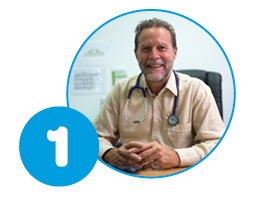Too many Australians with type 2 diabetes are in a bad relationship with their heart. Take Diabetes 2 Heart is about inspiring people with diabetes, and the people who love them, to take positive steps to better heart health. We want people with diabetes, and their partners, siblings, children and parents who love them, to take diabetes to heart. If you have a loved one living with type 2 diabetes, we encourage you to have a heart-to-heart conversation about looking after their health.
If you’re living with type 2 diabetes, make an appointment with your doctor today to talk about what you can do to lower your risk of heart disease, it might just save your life.
The Heart of the Matter
Cardiovascular disease is the leading cause of death in Australia, killing one Australian every 12 minutes.5
People living with diabetes are up to four times more likely to develop heart disease1 in their lifetime, making it a very serious issue, and one that we should be talking more about.
So have a heart-to-heart with those close to you, as well as your doctor, to manage your diabetes and heart health.
Read more about diabetes and heart disease in our factsheet.
When Chris had a heart attack a couple of years ago, it was a major shock. Chris didn’t know having type 2 diabetes increased his risk of having a heart attack. Now that he’s got his health back on track, he wants to share what he has learnt to help other people reduce their risk of having heart problems.
Fay and Yvonne are the best of friends. They both share a love of dancing. Yvonne has type 2 diabetes but she doesn’t want that to impact her long-term health. Yvonne understands she is at a higher risk of heart disease and that’s why she’s thankful her best friend Fay is always there to encourage her to take diabetes to heart.
A BAD RELATIONSHIP:
DIABETES & HEART DISEASE
When it comes to bad relationships, mending your broken heart is the first step to recovery.
But what if you don’t know your heart is broken? For people with type 2 diabetes, knowing your heart is at risk is the first step to reducing your risk.
The connection between type 2 diabetes and heart disease is closer than many Australians realise. People living with type 2 diabetes are two to four times more likely to develop heart disease¹ but only 12% think they are personally at risk.
The heart of the matter
Between one and three per cent of people with type 2 diabetes experience a heart attack every year.3 That means that in any given year between 11,000 and 33,000 Australians will suffer a diabetes-related heart attack. Heart disease contributes to just under two-thirds of all deaths in people with diabetes.2 Alarmingly two-thirds of people with type 2 diabetes do not know that heart disease is the number one cause of death for people with type 2 diabetes.
Why is this relationship so complicated?
Diabetes can cause plaque to build up on the walls of the arteries. This clogs up the arteries, making it easier for cholesterol to gather and making blood flow more difficult. This blockage can lead to heart attacks, strokes and even sudden death. Diabetes also damages the walls of blood vessels, making them more prone to injury from blood pressure, swelling in the arteries and plaque build-up.
What do I need to do?
Now is the time for you to take diabetes to heart. Have a serious conversation with your doctor about what you can do to reduce your risk.
It takes more than managing blood glucose levels to reduce your risk. If you have diabetes, speak to your general practitioner (GP) doctor about the relationship between diabetes and heart disease. If you have loved ones with type 2 diabetes, encourage them to take action and speak with their doctor. The sooner you do, the sooner your loved one can take action.
Download the ‘A bad relationship‘ fact sheet.
References
1 Haffner, S., Lehto, S., Rönnemaa, T., Pyörälä, K. and Laakso, M. (1998). Mortality from Coronary Heart Disease in Subjects with Type 2 Diabetes and in Nondiabetic Subjects with and without Prior Myocardial Infarction. New England Journal of Medicine, 339(4), pp.229-234.
2 Australian Institute of Health and Welfare 2017. Deaths among people with diabetes in Australia, 2009–2014. Cat. no. CVD 79. Canberra: AIHW.
3 Shaw, P., Thomas, P. and Magliano, A. (2018). The Dark Heart of Type 2 Diabetes. [online] Baker Heart and Diabetes Institute. Available at: https://www.baker.edu.au/-/media/documents/impact/Baker-Institute-The-dark-heart-of-type-2-diabetes.ashx?la=en [Accessed 8 Jun. 2018].
4 Australian Bureau of Statistics. National Health Survey: First Results, 2014-15. 2015; Available from: https://www.abs.gov.au/AUSSTATS/[email protected]/DetailsPage/4364.0.55.0012014-15?OpenDocument.
5 Australian Bureau of Statistics 2017, Causes of Death 2016, ABS cat. no. 3303.0, September.
HOW TO LOOK AFTER YOUR HEART

sEE YOUR
dOCTOR
Speaking with your GP can help you manage your diabetes and heart health. Speaking to a health professional is always recommended before making any changes to your lifestyle.

Eat
well
What you eat can play a big part in your heart health, with a balanced diet recommended to manage both heart disease and diabetes.

Get
MOVING
Daily exercise can help limit your risk of heart disease, as well as improve quality of life and other health benefits.
sHARE THE LOVE
Want to help others find the words for their heart-to-heart, or need help taking the first steps? Read other people’s stories of their journey with diabetes and heart health and find factsheets and information to help you along the way.
ABOUT THE CAMPAIGN
Diabetes Australia developed the Take Diabetes 2 Heart campaign to raise awareness of the link between type 2 diabetes and heart disease. Research shows nearly two-thirds of people with type 2 diabetes don’t know heart disease is the number one cause of death for people with type 2 diabetes2. Type 2 diabetes is the biggest health challenge facing Australia and heart disease is Australia’s leading cause of death5. This campaign encourages people to have a heart-to-heart with their loved ones about their risks and to see their GP.









